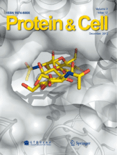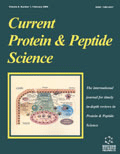
PROTEIN AND PEPTIDE LETTERS
Scope & Guideline
Pioneering pathways in therapeutic applications of proteins and peptides.
Introduction
Aims and Scopes
- Protein Structure and Function:
The journal publishes studies that explore the structural properties of proteins, their dynamics, and how these attributes relate to their biological functions. - Peptide Therapeutics and Drug Development:
Research on bioactive peptides, their mechanisms of action, and their potential applications in drug development and therapeutic interventions is a core focus. - Proteomics and Mass Spectrometry:
Innovative proteomic techniques, including mass spectrometry, are frequently featured, highlighting advancements in protein analysis and biomarker discovery. - Molecular Biology and Genetic Engineering:
The journal includes articles on the molecular mechanisms underlying gene expression, protein synthesis, and the use of genetic engineering techniques to modify proteins and peptides. - Biotechnology and Bioengineering Applications:
Studies that apply protein and peptide research to biotechnological processes, including enzyme engineering and the development of novel biomaterials, are emphasized. - Cancer Biology and Therapeutics:
There is a significant focus on the roles of proteins and peptides in cancer biology, including studies on oncogenic pathways and potential therapeutic targets. - Immunology and Vaccine Development:
Research related to the immunogenicity of proteins and peptides, including their use in vaccine development and immune response modulation, is also a key area of interest.
Trending and Emerging
- Protein-Protein Interactions and Networks:
There is a rising interest in studying protein-protein interactions and their implications in cellular networks, which is crucial for understanding complex biological processes. - Bioinformatics and Computational Biology:
The integration of bioinformatics tools to analyze protein structures, functions, and interactions is becoming more prevalent, facilitating deeper insights into protein science. - Peptide-Based Nanocarriers and Drug Delivery Systems:
Research on utilizing peptides as nanocarriers for drug delivery is on the rise, showcasing innovative approaches to enhance the bioavailability and efficacy of therapeutics. - Targeted Cancer Therapy:
A growing number of studies focus on the development of targeted therapies using engineered proteins and peptides, particularly in oncology, reflecting a shift towards personalized medicine. - Microbiome and Host Interactions:
Emerging research exploring the role of proteins and peptides in microbiome interactions and their effects on host health is gaining prominence, indicating a broader understanding of health and disease. - CRISPR and Gene Editing Technologies:
The applications of CRISPR and other gene-editing technologies in protein engineering and therapeutic development are increasingly being featured, highlighting their revolutionary impact on biotechnology.
Declining or Waning
- Traditional Enzymology:
Research focusing solely on classical enzymatic mechanisms without broader implications for protein engineering or therapeutic applications is waning, as interest shifts towards more applied and innovative approaches. - Basic Biochemical Pathways:
While foundational studies are essential, there is a noticeable decline in the publication of papers that exclusively describe basic metabolic pathways without integrating into larger biological or therapeutic contexts. - Agricultural Proteomics:
The application of proteomics specifically in agricultural settings, such as crop improvement, seems to be less emphasized in recent issues, indicating a shift towards more clinical and biomedical applications. - In Vitro Studies without Clinical Relevance:
Studies that focus solely on in vitro experiments without clear pathways to clinical application or relevance are becoming less common, as the journal seeks more translational research. - Historical Reviews on Protein Functions:
The journal appears to be moving away from historical reviews that do not incorporate current research trends or implications, favoring more forward-looking studies.
Similar Journals

FEBS LETTERS
Igniting Passion for Molecular and Cellular ResearchFEBS LETTERS, published by Wiley, is a prestigious journal that has firmly established its place in the fields of biochemistry, biophysics, genetics, molecular biology, cell biology, and structural biology. With an esteemed history dating back to 1968, this journal continues to be a vital resource for researchers and professionals involved in the biological sciences. It boasts impressive quartile rankings, including Q1 statuses in several categories such as Biochemistry and Genetics, reflecting its high impact factor and significant contribution to scientific discourse. FEBS LETTERS provides a platform for innovative findings and critical reviews, fostering the exchange of knowledge and ideas within the scientific community. Although it operates under a subscription model, the journal ensures broad dissemination of groundbreaking research through its rigorous peer-review process. The vibrant discussions encouraged by articles published in FEBS LETTERS aim to inspire current and future generations of scientists to push the boundaries of biological understanding, making it an indispensable resource for anyone dedicated to advancing their knowledge in these dynamic fields.

Protein & Cell
Exploring the Frontiers of Protein and Cell ResearchProtein & Cell, published by Oxford University Press, is a distinguished international journal focusing on cutting-edge research in the fields of biochemistry, biotechnology, cell biology, and drug discovery. This open access journal, active since 2014, is dedicated to disseminating innovative findings that advance our understanding of protein functions and cellular processes, making it an essential resource for researchers, professionals, and students alike. With an impressive 2023 impact factor reflected in its Q1 ranking across multiple categories such as Biochemistry, Drug Discovery, and Cell Biology, 'Protein & Cell' stands at the forefront of scientific research, driving collaboration and discussion in the scientific community. Researchers can access the journal freely online, fostering a global exchange of knowledge and contributing to significant advancements in medicine and biotechnology. Located in the United Kingdom, the journal strives to be a pivotal platform for impactful research that influences future studies and applications.

JOURNAL OF PEPTIDE SCIENCE
Connecting biochemistry with therapeutic applications.JOURNAL OF PEPTIDE SCIENCE, published by Wiley, is a vital resource for researchers and professionals in the fields of biochemistry, drug discovery, and molecular biology. Established in 1995 and encompassing research through 2024, this journal provides a platform for disseminating cutting-edge studies related to peptide synthesis, structure, function, and applications in therapeutics. Although it currently does not offer open access, its robust content has earned it a respectable Q3 ranking in several categories, including biochemistry and pharmacology, according to the latest metrics. Researchers will find significant insights linked to peptide chemistry and its implications in medical sciences, making the JOURNAL OF PEPTIDE SCIENCE an essential addition to academic libraries and for those passionate about peptide research and its potential breakthroughs.

Cell Chemical Biology
Catalyzing Discoveries in Biochemistry and Beyond.Cell Chemical Biology, published by Cell Press, stands at the forefront of interdisciplinary research in the realms of biochemistry, molecular biology, and pharmacology. With a robust impact factor evident in its prestigious Q1 quartile rankings across multiple categories including Clinical Biochemistry and Drug Discovery for 2023, this journal serves as a critical platform for disseminating cutting-edge scientific discoveries. As an Open Access publication, it ensures that vital research is accessible to a wide audience, fostering collaborations and driving innovation in the life sciences. Based in the United States, and featuring publications from 2016 to 2024, Cell Chemical Biology invites researchers, professionals, and students alike to contribute to its mission of advancing knowledge through rigorous peer-reviewed articles that address both fundamental and applied aspects of chemical biology.

BIOCHEMICAL AND BIOPHYSICAL RESEARCH COMMUNICATIONS
Unveiling the complexities of molecular life.BIOCHEMICAL AND BIOPHYSICAL RESEARCH COMMUNICATIONS, published by Academic Press Inc Elsevier Science, stands as a leading periodical in the fields of biochemistry, biophysics, cell biology, and molecular biology. With an ISSN of 0006-291X and an E-ISSN of 1090-2104, this esteemed journal has been a pivotal platform for the dissemination of groundbreaking research since its inception in 1959, continuing to publish influential findings through at least 2024. It holds a commendable Q2 ranking in Biochemistry and Q1 status in Biophysics as of 2023, reflecting its high impact and relevance in the field, supported by its strong Scopus rankings—ranking #43 in Biophysics and maintaining a presence in the top quartiles of several related categories. Although it is not an open-access journal, it provides critical insights and essential data that cater to researchers, professionals, and students keen on advancing their understanding of complex biochemical and biophysical processes. Its significant contributions to the scientific community underscore the importance of this journal as a reference point for innovative research and collaborative discourse.

TRENDS IN BIOCHEMICAL SCIENCES
Empowering Breakthroughs in Molecular BiologyTRENDS IN BIOCHEMICAL SCIENCES is a premier academic journal published by CELL PRESS, focusing on the latest advancements and insights in the dynamic fields of biochemistry and molecular biology. With an ISSN of 0968-0004 and an E-ISSN of 1362-4326, this journal has established itself as a leading source of high-impact research, boasting an impressive Q1 category ranking in both Biochemistry and Molecular Biology as of 2023. The journal's Scopus Ranks further highlight its significance, placing it in the top 3% and 4% of its respective fields, emphasizing its role as a vital platform for disseminating innovative research. Published since 1976 and continuing through 2024, TRENDS IN BIOCHEMICAL SCIENCES provides a comprehensive overview of the latest trends, methods, and applications, helping researchers, professionals, and students stay at the forefront of their disciplines. Although it offers traditional access options, the journal's rich content and authoritative analysis make it a must-read for those pursuing cutting-edge biochemical research.

CURRENT PROTEIN & PEPTIDE SCIENCE
Elevating Scientific Inquiry in Protein and Peptide ScienceCURRENT PROTEIN & PEPTIDE SCIENCE, published by Bentham Science Publishers, is a pivotal journal dedicated to the dynamic and rapidly evolving fields of protein and peptide research. With an ISSN of 1389-2037 and an E-ISSN of 1875-5550, this esteemed journal serves as a platform for disseminating cutting-edge findings from various disciplines, including biochemistry, cell biology, and molecular biology. Recognized for its influence with a 2023 Scopus ranking placing it within the top quartiles of its categories—Q3 in Biochemistry, Q4 in Cell Biology, and Q2 in Medicine—the journal not only enhances the visibility of critical research but also supports the academic community in advancing our understanding of the molecular foundations of life. Established in 2000 and running through 2024, CURRENT PROTEIN & PEPTIDE SCIENCE is positioned to cater to the interests of researchers, professionals, and students alike, providing them with open access to vital knowledge that fuels innovation and scientific inquiry in the United Arab Emirates and beyond.

JOURNAL OF BIOLOGICAL CHEMISTRY
Connecting Research and Innovation in BiochemistryJOURNAL OF BIOLOGICAL CHEMISTRY, published by Elsevier, is a premier interdisciplinary journal dedicated to advancing our understanding of biochemistry, cell biology, and molecular biology. With a prestigious history dating back to 1945 and an impressive convergence of research expected to continue through 2024, this journal holds a Q1 ranking in all three of its core categories, signaling its critical influence in the respective fields, supported by a robust Scopus ranking that places it among the top echelons of internationally recognized research. Although currently not available as Open Access, the journal is essential for researchers and professionals looking to stay abreast of the latest breakthroughs and innovations in biochemical research. With a deep commitment to scientific rigor and a focus on diverse topics ranging from cellular processes to molecular mechanisms, the Journal of Biological Chemistry serves as a vital resource for the academic community, shaping the future of biological sciences.

Current Proteomics
Unveiling Cutting-Edge Proteomic MethodologiesCurrent Proteomics is a distinguished journal dedicated to the dynamic field of proteomics, offering researchers and professionals a platform to disseminate innovative findings and comprehensive reviews. Published by Bentham Science Publishers Ltd, this journal caters to a global audience and serves as an essential resource for students, academics, and industry experts interested in advances in biochemistry and molecular biology. With an ISSN of 1570-1646 and an E-ISSN of 1875-6247, the journal has established itself in various research categories, achieving a Q4 ranking in both Biochemistry and Molecular Biology as of 2023. While the impact factor and H-index data are not specified, its Scopus ranking reflects a competitive position in its fields, with percentiles in the 12th to 16th range. Although not an open-access journal, Current Proteomics is vital for fostering ongoing dialogue and collaboration in proteomic research, encouraging contributions that explore cutting-edge methodologies and applications. Researchers are invited to share their insights and contribute to this evolving discipline, thus enhancing the collective understanding of proteomics within the scientific community.

PROTEOMICS
Pioneering discoveries in protein function and interaction.PROTEOMICS is a leading journal focused on the rapidly evolving field of proteomics, published by WILEY in Germany. With a solid reputation established since its inception in 2001, it has continually contributed to the understanding of protein functions and interactions within biological systems. As part of its commitment to academic excellence, PROTEOMICS is ranked in the second quartile for both Biochemistry and Molecular Biology categories (2023), reflecting its significant influence in advancing research in these areas. Although it does not currently provide open access options, it remains a vital resource for researchers, professionals, and students keen to explore innovative methodologies and findings in proteomic research. By publishing groundbreaking studies that bridge theoretical knowledge with practical applications, PROTEOMICS plays a crucial role in enhancing our understanding of molecular processes and driving forward advancements in the life sciences.